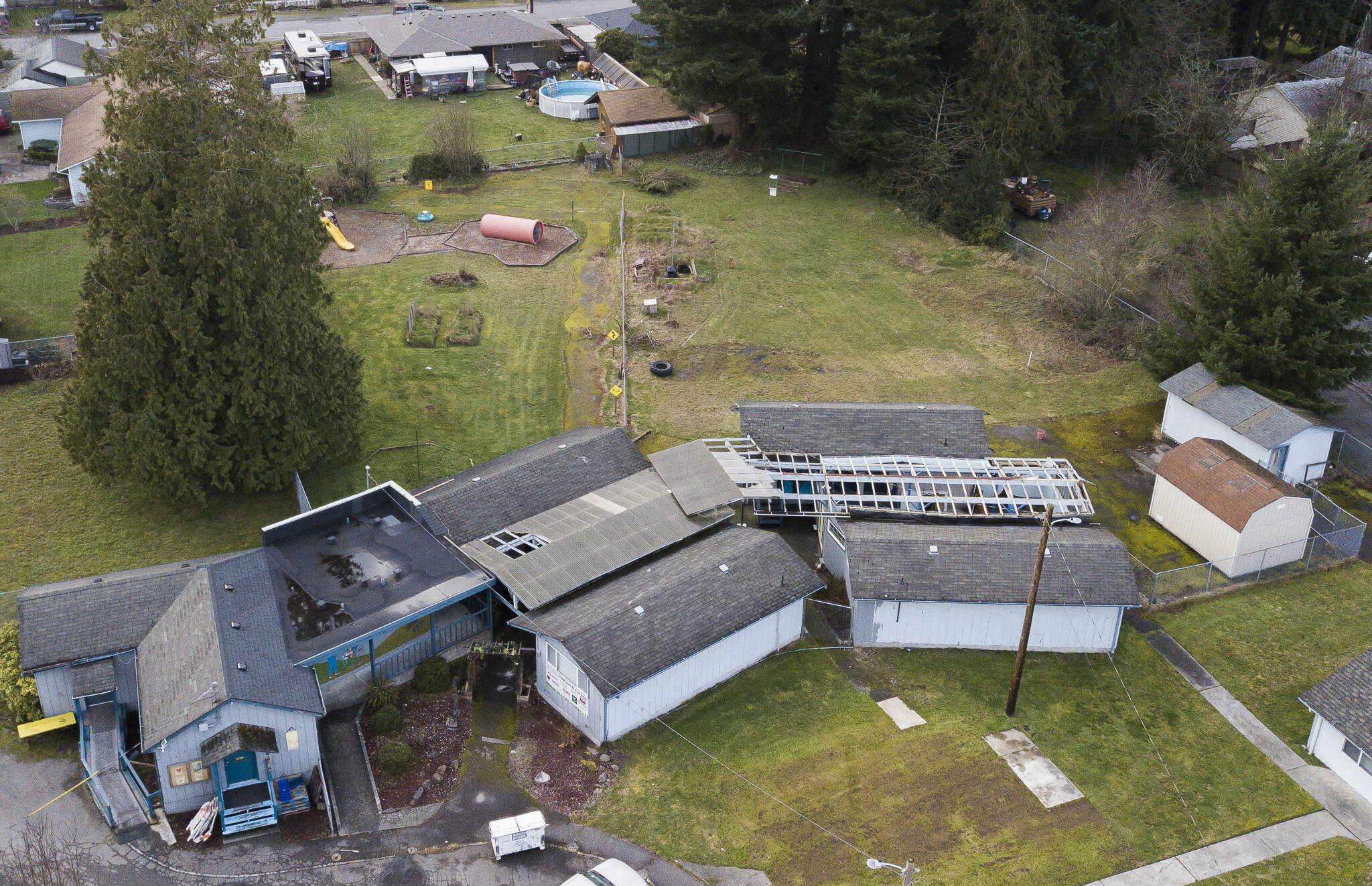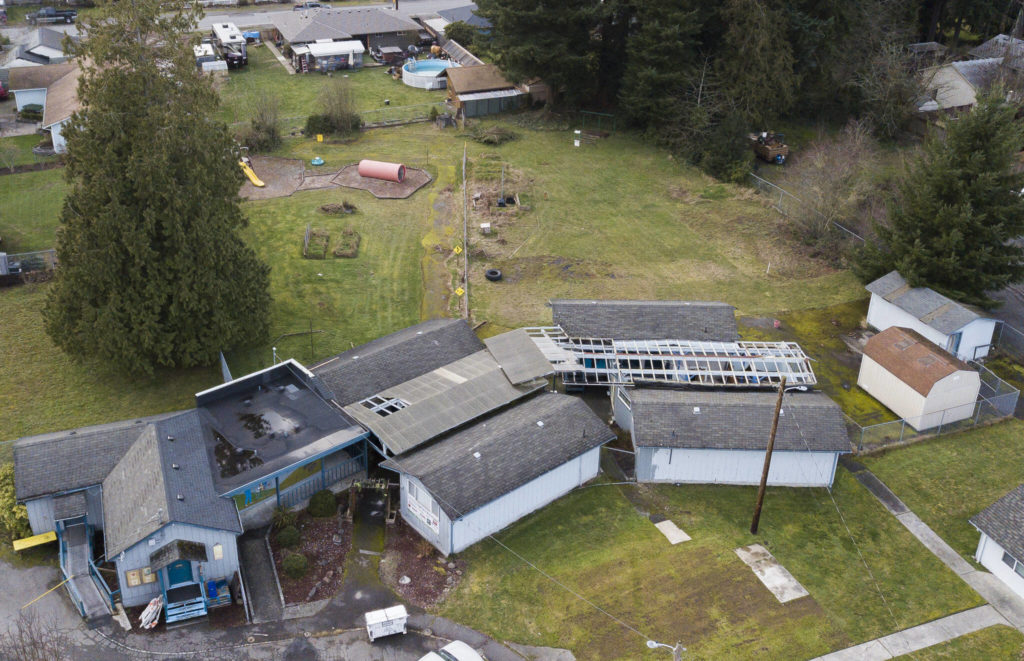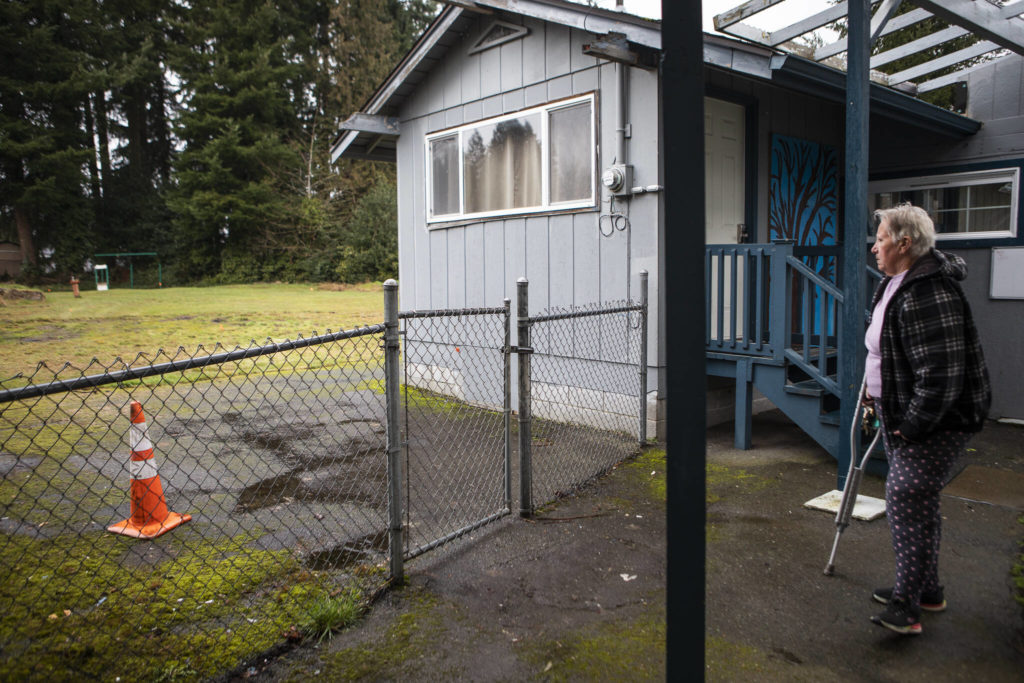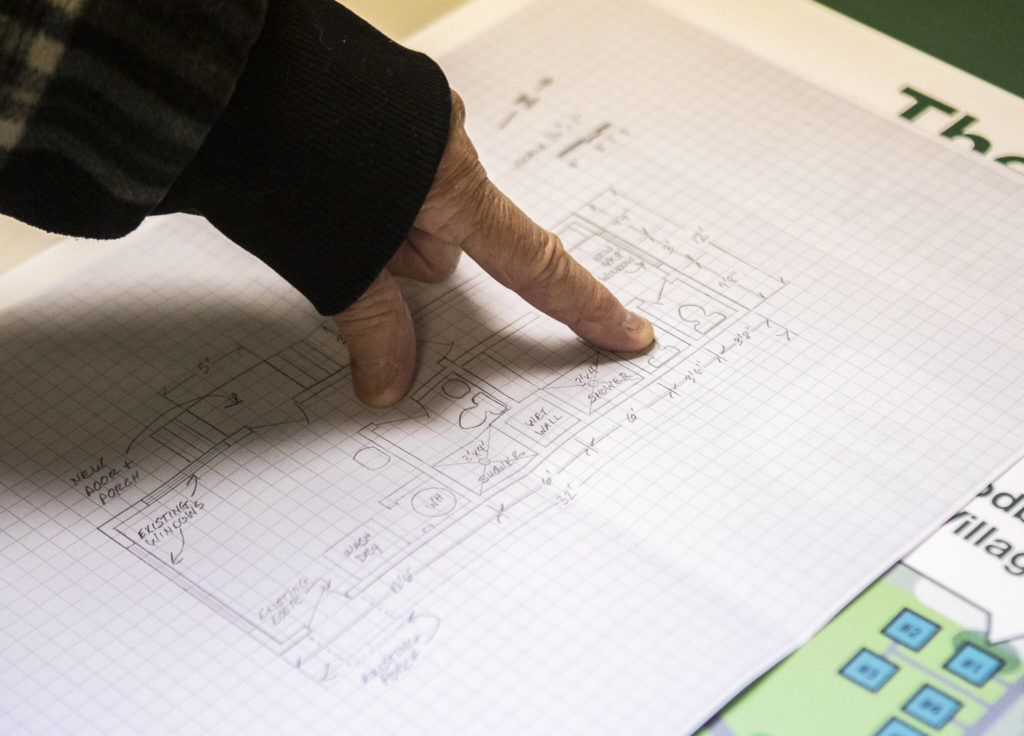EVERETT — Roxana Boroujerdi sees a lot of people at the weekly food bank and hot meal programs at Faith Lutheran Church.
She lives in the Silver Lake area and commutes at least three times a week to 6708 Cady Road. The church’s former day care buildings now house the Faith Food Bank pantry, and its fellowship hall hosts the free dinners.
When the pandemic made in-person contact risky, they started offering groceries and meals to go. Each week about 250 vehicles came through for the food bank and another hundred or so people showed up for dinner.
Through it all, the families Boroujerdi saw stood out.
A handful of shelters exist in Snohomish County for children, men, women and, in the past year, couples. There aren’t enough beds to meet the demand, though. And spaces for families, which generally require more square footage and support, are limited.
“There’s no place here for a whole family to be together,” Boroujerdi said.
She and other members of the Faith Food Bank nonprofit and the church want to help by hosting a temporary shelter called Faith Family Village.
The church has the property. The city or federal funds could pay for site work, the shelters and operations. Another agency would manage the residents.
Boroujerdi and church leaders have worked on the idea over the winter. They have met with some of their next-door neighbors about the proposal. They intend to submit the land use permit application this month after pre-application documents late last year. That process could take four to six months, though they’re hopeful it gets through sooner.
Their plans include eight units. Each would have, at most, four people.
Everett-based company Pallet would make the 100-square-foot temporary homes.
The units would be on the northwest section of the property in two rows of four. Each unit has beds, electricity, heating and air conditioning. Residents would have access to a shared kitchen building and a shared bathroom building envisioned with separate toilets and showers for women and young children, then teen boys and men.
Neighbors and others already started donating bedding, storage bins and towels.
Everett city staff have marked $415,000 of the $20.7 million federal American Rescue Plan Act funds toward the project. But the amount could vary if U.S. Rep. Rick Larsen’s request for $254,560 for Pallets to Housing makes it in the federal budget. As of Friday morning, the House and Senate passed that budget, and President Joe Biden was expected to sign it.
The city could use some of the 40 units purchased last year using federal American Rescue Plan Act money. If the other federal funding comes through, Everett may use its money to help with site work to prepare the property and for two-year operational funding.
“Ensuring we have adequate shelter for youth in our community, to stop the pipeline of homelessness in our community, that’s why it’s important,” Everett Community Development director Julie Willie said.
Those homes could help people like Dameon Smith and Latina Banks, who have a baby boy and a toddler daughter. They’re living at a south Everett motel using vouchers. Before that, they took shelter in a rental car and a different motel for two months.
Seeking housing in Snohomish County can be difficult. Some rental screening processes exclude people with low credit scores or felony convictions.
Places where Smith and Banks might be welcome are full, and applications and referrals to permanent housing through Snohomish County’s Coordinated Entry Program are backed up.
“I don’t feel like we should still be out on the streets waiting for this to go through,” Smith said.
Recently, Volunteers of America, the main nonprofit that distributes rental assistance in Snohomish County, stopped taking applications. Money is still available for people who are 14 days from an eviction, but it’s unclear when other renters can start applying for help again.
Snohomish County had 1,132 people in 897 households considered homeless during the 2020 Point-in-Time Count. That includes people in emergency shelters and transitional housing, as well as those on the streets, in a car or in abandoned buildings.
Interfaith Family Shelter would screen and refer residents to Faith Family Village and provide an on-site case manager to help them find housing and access other social services. The organization has worked to get families into safe housing for 34 years, operating a cars-to-housing program at two sites in Everett, as well as shelters in Everett and Marysville.
“People who do not have shelter — stable shelter — to live, are unable to do almost all of the functions of life,” Interfaith executive director Jim Dean said. “But it’s also a really big indicator of health.”
Typically, Interfaith staff try to identify a place for a family to move within their first 60 days. The final 30 days are meant for the move into a new home. That pipeline is jammed now.
That timeline has been longer during the pandemic. Last year the agency helped 178 people from 55 families — down from 255 people in 2019. The need didn’t decrease, but the availability of affordable housing did. It meant fewer people rotating through the 90-day programs.
“The units to move them into is the problem,” Dean said. “We would much rather have a family stay with us for as short a time as possible.”
Residents in the Madison neighborhood shared concerns about how long the shelter would exist, security and trash. Faith Family Village and Interfaith leaders are still sorting through some of the details but have a shape for some of the operations.
The shelter would be funded for at least two years. But families experienced homelessness before the pandemic and are likely to continue facing it, especially as population growth outpaces the housing supply, Dean said.
Faith Food Bank leaders plan to install an eight-foot fence with a key code gate for residents and are considering security cameras on the property as well as a security guard.
A new community advisory board of neighbors, church and food bank leaders and Interfaith staff could establish rules for residents and be a channel to share concerns and seek support, Boroujerdi said.
As the proposal moves through the city’s review, Smith and Banks — and others in similar situations — must keep waiting.
“All I can do right now is look for help, apply for hotel vouchers, keep working and praying that God comes through with another hotel voucher so we can pay for the hotel so me and my family don’t live outside again,” Smith said.
Need help?
Residents can access local social service programs by calling 211. For a comprehensive list of resources in Snohomish County, see the county’s recent guide.
Ben Watanabe: bwatanabe@heraldnet.com;
Talk to us
> Give us your news tips.
> Send us a letter to the editor.
> More Herald contact information.





























